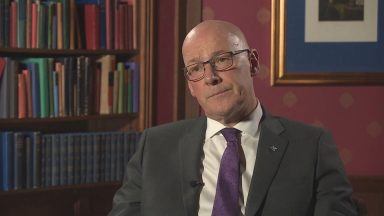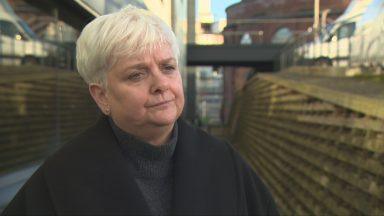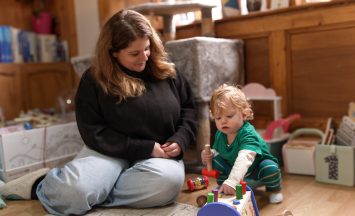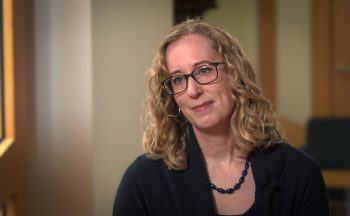Five years ago, coercive control was made a criminal offence in Scotland.
The Domestic Abuse (Scotland) Act 2018 was then hailed as the “gold standard” of domestic abuse legislation.
But victims say they’re still not fully confident that they’ll achieve justice.
This article contains descriptions of domestic abuse, sexual assault, and suicide.
Coercive control is a form of domestic abuse that leaves a victim dependent on their abuser.
That can be done through threats, manipulation, or intimidation.
Abusers may monitor their victim’s movements, control their finances, or dictate who they see and speak to.
Bethany* recently left her marriage, after being subjected to years of abuse by her now ex-husband.
She told Scotland Tonight: “I can look back to things like name-calling, put-downs… I guess you would call it verbal abuse.
“There would be things like, ‘have you been out today?’ ‘No, I’ve been at home with the baby.’ ‘Why have you not been out? You should be getting out. You shouldn’t be staying in the house.’

“But then on days when I was out, ‘You should have been home today. This house is a mess. Why have you been out?’”
It took Bethany a long time to recognise that what she was experiencing was domestic abuse.
She said: “I didn’t know the next time that I was going to do something that would trigger his abusive behaviour.
“I didn’t know when he was next going to erupt and so things might be going well for a few days and then all of a sudden he would just snap at me.
“That was scary. It was soul-destroying at times.“
Bethany reported her ex-husband to the police on a number of occasions.
The first time, an officer told Bethany that one incident she had described was rape.
She said: “When I had told them everything, one of the police officers said, ‘I believe you have a case for coercive control here’. That was really validating, for somebody to see that for what it was.’”
But, on a later occasion, Bethany says she didn’t feel as supported.

The officer she spoke to had no record of her previous statement.
“I had to relay the whole story again,” Bethany told Scotland Tonight.
“And that officer said, ‘I can really see what you’ve been through here’.
“But also went on to say, ‘I’d think very carefully if I were you, about taking this further. You need to think about the fact that your ex-husband could lose his job. Your children would have to be interviewed by specialist police officers and that could be an extremely traumatic process for them’.
She said the officer asked: “Do you really want your children to go through that?’
Bethany said it convinced her not take the matter further.
Eventually, despite being told she would have had a strong case for coercive control, Bethany decided not to pursue criminal charges against her ex-husband.
She said: “I hadn’t the confidence that it would change things. In fact, the fear was that my situation would be worse for me and my children.
“I think we need to be able to have more confidence in the system. I know people who have been bold and courageous and they actually have reported to the police and they’ve had it investigated.
“But then as they go to the criminal justice system, they are facing an uphill battle towards justice for what’s been done to them.”
‘You’re full of resentment. You’re full of fear‘

Tom* agrees that there needs to be more understanding of what coercive control looks like, and the impact it can have on a victim’s life.
He has also recently left an abusive relationship.
Tom says it took him a long time to recognise the warning signs.
“My missus had my wallet, my finances, my National Insurance number,” he said.
“I couldn’t even go and get my hair cut. It was mad. I couldn’t go a half hour walk without my phone blowing up. I had trackers on my phone.
“It’s everything from the clothes you wear, how you interact with people, how you talk to people. It totally takes control over your life. One bit at a time. It’s subtle, but it’s lethal.”
Tom said accepting that he was a victim was extremely difficult.
“To me at that point I thought an abusive relationship was either a man hitting a woman, or a woman hitting a man, or murder,” he told Scotland Tonight.
He reached the stage where he attempted to take his own life.
Thankfully, he survived, and found support through the mental health group Men Matter Scotland.
But despite having left the relationship, he is still dealing with coercive control.
“The post separation abuse still happens – it’s still ongoing to this day,” he said.
“It’s not as bad as what it was. But that’s because I’ve got the tools to deal with it.”
On having the confidence to report coercive control, Tom said: “It’s still a very grey area, because how do you prove it? But until it’s reported, it can’t really be dealt with. So raising awareness, it needs to be done.”
In a statement, Police Scotland said: “Our officers are trained to look beyond physical abuse, to identify coercive and controlling behaviours, disparate incidents which, taken together, provide clear evidence of an abusive relationship.
“This includes in-depth, face to face training, for probationers and all frontline officers to ensure they identify the full spectrum of abusive behaviours, including coercion and control.

“Listening to victims is key, hearing their experience is crucial in helping us improve and deliver a service that meets people’s individual needs.
“Ultimately, we are working, with partners, to prevent domestic abuse, and to reduce the harm it causes. Society is changing, domestic abuse in all its forms, is no longer acceptable nor ignored.”
The Crown Office and Procurator Fiscal Service said: “[We take] a robust approach to the investigation of domestic abuse, including a presumption in favour of prosecution.
“The Domestic Abuse Scotland Act criminalises coercively controlling domestic abuse, to obtain justice for victims’ whole experience. It allows prosecutors to address emotional, economic, and psychological abuse, as well as physical violence.
“We recognise that it takes courage for victims to share their experiences of abuse. Prosecutors are working to build victims’ trust, and facilitate their safety through special measures, such as giving evidence away from the accused.
“A key priority for prosecutors is developing our understanding, by listening to victims and on-going training, to better recognise the impact of controlling and coercive behaviour.”
*Names have been changed.
See the full report, Scotland Tonight: Challenging Coercive Control, Thursday at 8.30pm on STV and the STV Player.
If you have been affected by any of these issues, help is available through the charity Victim Support Scotland. It has a free support line, on 0800 160 1985 (8am-8pm, Mon-Fri).
Help and support is available now if you need it. Details of services available can be found at stv.tv/advice
The Samaritans can be contacted any time, from any phone, free on 116 123, email at jo@samaritans.org, or visit samaritans.org to find your nearest branch.
Follow STV News on WhatsApp
Scan the QR code on your mobile device for all the latest news from around the country




























